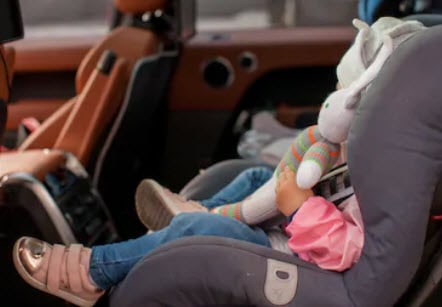
State law only requires children two and under to be in rear-facing car seats. But the American Academy of Pediatrics recommends all infants and toddlers sit in rear-facing car safety seats for as long as possible, usually until they have outgrown the seat’s height and weight limitations, and usually until at least age four.
Across the state, 62 percent of kids are restrained in car and booster seats incorrectly, said Kevin Poore, program coordinator for child passenger safety at the S.C. Department of Health and Environmental Control. Furthermore, in 2022, 30 percent of children treated at The Medical University of South Carolina’s emergency department for crash-related injuries were improperly restrained or unrestrained altogether, according to Mary Beth Vassy, MUSC’s pediatric trauma injury prevention coordinator.
Between 2016 and 2020, children in the under-four age group died in motor vehicle accidents at a higher rate than other age groups in the state.
Special Issues in Child Injury Claims
Even if their children sustain serious injuries in a car accident, many parents hesitate to partner with a Columbia child injury attorney in these situations. These caregivers don’t want to “blame” a tortfeasor (negligent driver) for an “accident.” This sentiment is especially common if an insurance company paid most or all of the medical bills.
Criminal courts force some drivers to take the blame for some crashes, especially if the driver was intoxicated or drove extremely recklessly.
Personal injury claims in civil courts force drivers to accept responsibility for the mistakes they make. If Alice drops a baby bottle, she should pay compensation. If Alice drops a baby, she should pay compensation. The compensation is much higher in the second case. A person is worth much more than a bottle.
In a perfect world, tortfeasors would voluntarily accept responsibility for their mistakes, and a Columbia personal injury attorney wouldn’t need to get involved. But we don’t live in a perfect world.
Moreover, most car crashes are not unavoidable and inevitable accidents. People don’t accidentally drive drunk or recklessly and cause crashes. Additionally, in terms of responsibility, it doesn’t matter. If Alice accidentally dropped a baby bottle or a baby, she should still pay compensation.
Finally, the tortfeasor, and no one else, should pay compensation. If a health insurance company pays the bill, we all pay it. Our taxes and/or insurance premiums go up to offset that payment.
On a related note, many group health insurance policies exclude injury-related expenses. When insurance auditors discover such payments, they often demand reimbursement, putting the family in an even worse financial situation.
The Seat Belt Defense in South Carolina
This defense often comes up regardless of the victim’s age. It’s a little more common in young child injury cases. As mentioned, there’s a disconnect between state legal requirements and AAP recommendations. Additionally, as mentioned above, caregivers improperly install a number of car seats.
In many states, if victims aren’t properly restrained, insurance company lawyers can blame these victims for their own injuries, even if the tortfeasor was clearly negligent. However, it’s not enough to cite safety statistics in these cases. Instead, an insurance company lawyer must prove, in that specific case, that the victim’s failure to properly wear a seat belt, as opposed to the tortfeasor’s negligence, substantially caused injury.
South Carolina is different. Even though the Palmetto State, like most other jurisdictions, has an extremely broad mandatory seat belt law that applies to all vehicle occupants, not just front seat occupants, seat belt non-use is not admissible as evidence in a civil action.
Reach Out to a Diligent Richland County Lawyer
Injury victims are entitled to significant compensation. For a free consultation with an experienced personal injury lawyer in Columbia, contact the Marc Brown Law Firm. We do not charge upfront legal fees in these matters.
Source:
publications.aap.org/pediatrics/article/142/5/e20182460/38530/Child-Passenger-Safety?_ga=2.177259557.1429951175.1658855134-1947245400.1656679944?autologincheck=redirected